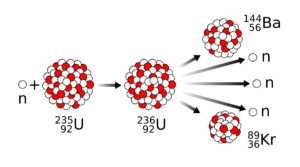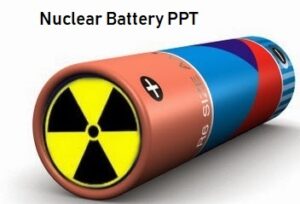In this article how we can convert nuclear energy to electrical energy is going to be discussed.
In the nuclear power plants nuclear fission reactions take place continuously. These fission reactions produce huge amounts of heat energy from the nuclear energy that in turn boils water and produces steam. The blades of a turbine are turned using this steamed water. The movement of the blades is used as a driver to drive the electric generator to produce electricity.
How is nuclear energy converted to electrical energy
First we will try to relate electric motors and nuclear reactors indirectly. An electric motor is divided into two parts. The still part is the stator and the rotating part inside the stator is the rotor. Due to the nuclear fission reaction that is taking place inside the core of the nuclear reactor the fuel rods become hot and produce heat energy.
This heat in turn is used to boil water and produce steam that is used to rotate the rotor of the electric motor. When this rotor rotates the electricity emits out from the stator. The steam that is produced from the boiling water acquires more space than the boiling water from which it is produced.
Can nuclear energy replace electricity?
In the earlier times coal was the only source of generating electricity. But as days are passing by, the usage and dependence of coal for electricity generation are decreasing slowly. After some time coal will be wholly replaced by nuclear energy in the field of production of electricity.
Coal is the source of one third electricity generation globally. The closure of the coal plants is affecting production of electricity at a very high rate,this gap is filled by the nuclear reactors on a global scale.
Again nuclear power plants are more advantageous than the coal plants as they need the least amount of electric power to provide an electric grid at any time in all weather conditions.

How to generate electricity from nuclear energy?
Before going to start the actual process of electricity generation step by step the two processes of nuclear energy production should be clarified in a brief manner. Nuclear fission and nuclear fusion are the two types of chemical reactions that are used to produce electricity.
Nuclear fission is the process in which heavy radioactive elements like uranium,plutonium etc are divided into two equal parts. This procedure is cumulative in nature. In case of nuclear fusion light weight radioactive elements combine with each other to make a heavy weight nuclei.
The process of generating electricity from the nuclear energy is illustrated step by step:
- Through nuclear fission reaction heavy elements split into lighter ones and release huge amounts of heat energy.
- This heat is used to make steam.
- A turbine that is connected to an electromagnet is known as a generator of electricity. This generator is turned by the steam.
- At last electricity is produced from this generator.
Nuclear energy to electrical energy examples
20+ nuclear energy to electrical energy examples are written below:
- Nuclear fission reactors
- Nuclear fusion reactors
- Thermionic generators
- MRI machine
- Renal Scintigraphy
- Thyroid scanning
- Bone scanning
- Gallium scanning
- Heart scanning
- Brain scanning
- PET scanner
- Gallbladder radionuclide scanning
- Nuclear ventriculography
- Pulmonary ventilation
- Lungs scanning
- Chemotherapy
- Thallium cardiac stress test
- Nuclear batteries
- Nuclear weapons
- Nuclear fuels
Nuclear fission reactors
The most important example of conversion of nuclear energy to electrical energy are the nuclear fission reactors. For production of electricity in a nuclear power plant these types of reactors are used. In these types of reactors nuclear fission reactions take place which in turn produces heat energy.
This heat energy is used to boil water in the reactors and the produced steam drives the blades of the turbine. So here this heat energy is converted into mechanical energy first and after that this mechanical energy is changed to electricity means electrical energy.

Nuclear fusion reactors
Nuclear fusion reactors are of the same importance as the nuclear fission reactors. This is another most important example of converting nuclear energy to electrical energy. The only difference between these two reactors is that in fission reactors nuclear fission reactions take place whereas in nuclear fusion reactors nuclear fusion reactions take place.

Mechanism of conversion of nuclear energy to electrical energy is the same for both the reactors.
Thermionic generators
In a thermionic generator basically heat is transformed to electrical energy. But the source that supplies heat energy to this type of generator sometimes can be a nuclear source. So in a nuclear thermionic generator at first fission or fusion reactions take place which in turn produce heat energy and after that electrical energy.
MRI machine
Magnetic Resonance Imaging machines basically use x rays. But in some modern MRI machines nuclear technology is used that convert nuclear energy to electrical energy.
Renal Scintigraphy
The components of renal scanning or Renal Scintigraphy are a small amount of radioactive elements,a gamma camera and a computer. In this type of scanning kidney functions are checked. In this machine also nuclear energy to electrical energy conversion is taking place.
Thyroid scanning
In this type of scanning machine Iodine is used as the radioactive material. With the help of this thyroid,hyperthyroidism etc are detected in a patient’s body.
Bone scanning
By bone scanning we can detect problems related to the bones of our body. They also use nuclear imaging technology to work properly.
Gallium scanning
To identify the cells that are dividing most quickly this type of scanning is used. They can also detect the cancer cells in a patient’s body.
Heart scanning
This machine also works on nuclear imaging technology. This is used to check whether the heart is working properly or not.
Brain scanning
This is also an example of conversion of nuclear energy to electrical energy through which functions of the brain are checked.
PET scanner
Positron Emission Tomography scanners use nuclear imaging technology to work. A small amount of radiopharmaceutical is used to detect the normal and abnormal metabolic functions in a patient’s body.

Gallbladder radionuclide scanning
This is also another example of nuclear energy to electrical energy in the medical field.
Nuclear ventriculography
This is a noninvasive process that uses radioactive drugs(tracers) in a smaller amount to show the heart chambers.
Pulmonary ventilation
This is the process of inhalation and exhalation through using nuclear imaging technology.
Lungs scanning
This is used to detect lung problems using nuclear imaging technology.
Chemotherapy
Chemotherapy uses certain radioactive drugs to stop the growth of quickly growing cancer cells.
Thallium cardiac stress test
Through this image based study a doctor can know how well blood is flowing and circulating in our bodies.
Nuclear batteries
These types of batteries are mainly used in aircraft,spacecrafts,scientific stations etc. they use chain reaction methods unlike the nuclear reactors. In these batteries decay of radioactive elements is used to produce electricity.

Nuclear weapons
From nuclear weapons we can also obtain electrical energy from nuclear energy.
Nuclear fuels
Nuclear fuels also help in converting nuclear energy to electrical energy. There are mainly used in the reactors.
Also Read:
- How to find the energy of a damped oscillator
- How to determine energy in a van de graaff generator
- How to measure the magnetic energy stored in a particle accelerator s magnets
- How to find energy transfer in heat exchange
- How to estimate energy transfer in photosynthesis
- Why does energy play a role in topological insulators
- What does gravitational potential energy depend on
- How to find internal energy
- How to calculate free energy of a system
- Why is energy critical in aerospace engineering
Hi…I am Ankita Biswas. I have done my B.Sc in physics Honours and my M.Sc in Electronics. Currently, I am working as a Physics teacher in a Higher Secondary School. I am very enthusiastic about the high-energy physics field. I love to write complicated physics concepts in understandable and simple words.